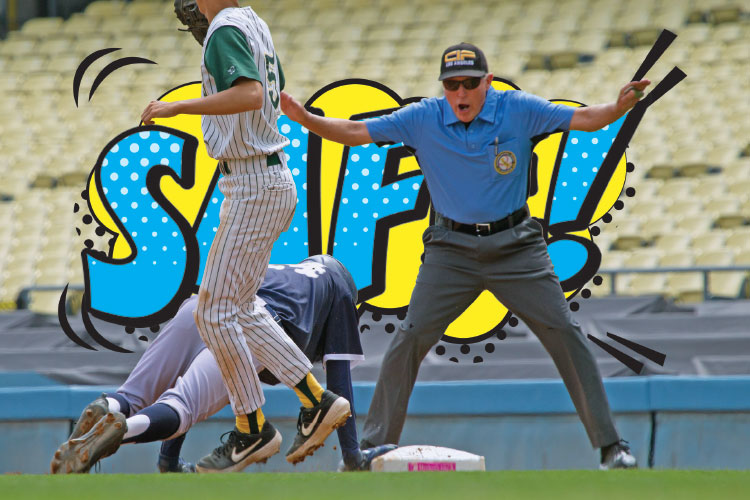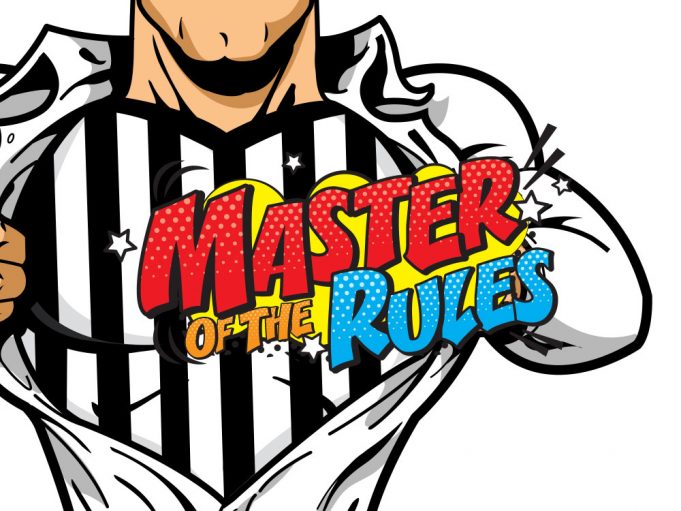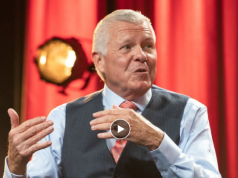Mastery of playing rules doesn’t just mean ‘knowing’ what a rule reads
Rod Serling might have put it this way:
Imagine you’re attending your final year of college. You’ve invested hard work, time and money studying for a profession you’ve chosen for the rest of your life. Then, just before finals, the university announces your exams and term papers won’t be graded; in fact, no transcript or diploma will be provided at all.
When you go job hunting, the only record of your education and training will be that you attended. While you might have some idea of how well you did, you have no proof. Without some grades to compare yourself to others, you have no context to convince anyone — yourself, your peers or a prospective employer — of your true ability. How good are you really, and what is your realistic future?
These days, learning your rulebook may feel a lot like this proposition by the host of “The Twilight Zone.” More and more, we’re expected to learn the rules and prove our knowledge by what is often an open-book, online examination allowing multiple chances to achieve only a modicum of success; resources are scarce all over, you know. As we progress through the ranks, we might be against more-demanding testing regimens, but learning the rules ultimately comes down to knowing what to do and when to do it while under the bright lights on the field or court.

Many of us can feel as alone mastering the rules as we might feel cheated. If we put the time and effort in, how do we really know we’ve learned the rules well enough? Meanwhile, a smart eighth grader, who’s never watched a game, could conceivably use the search function in the NFHS’s online rulebooks to pass the online test and “qualify” right along with us; what did this prove?
The good news is it isn’t as dire as it might seem. The experts will tell you it’s still comfortably in your own hands to become proficient with the rules and confident in their application, with or without a piece of paper to “prove” it.
Brent Rice is an assistant director for the Michigan High School Athletic Association, responsible for the administration of baseball and all of the state’s officials. He spent 13 years in the minor leagues, many of them while serving as a rules instructor at the Wendelstedt Umpire School, with graduates often reaching the major leagues. “I’ve learned to become a good rules umpire by learning how to teach the rules,” Rice said. “… It was learning how to convey them to 150 students who were coming in trying to move into professional baseball that did that.”
Setting a goal of learning the rules in excruciating detail shouldn’t be the object of the exercise, he said. “For baseball — and I think I see this in some other sports, as well — a lot of officials, when they try to learn the rules, try to find the hardest, most difficult knotty problems that they can, rather than the very fundamental rules. … And that not only messes them up for those when they rarely occur, but also it takes them off of their fundamentals. Generally, they may not be good rules officials.”
Rice believes when you study the rules regularly and challenge your understanding through a lot of “what-ifs,” you inevitably improve. He said you have to make rulebooks “bathroom readers” which you regularly review. “If you’re constantly refreshing yourself, then you’re going to be prepared when those unusual situations arise. I learned a lot by listening to the guy standing in front of me.”
“Being able to explain the rules to a neophyte is a sign that you have a complete and full understanding of the rules,” said Steve Hall, the state football rules interpreter for New Hampshire for 20 years and a member of the NFHS Football Rules Committee, including a four-year stint on the editorial committee. “You’ve developed the communication skill set you need to communicate with coaches who may have questions. And this just gives you so much more confidence on the field.”
Hall agrees listening is both the cheapest and often most-underutilized skill. He doesn’t have a problem with the use of open-book testing of rules knowledge but thinks officials don’t take advantage of the concept the way they could. He believes the important thing is for officials to get together and work through the rules; the adage of steel sharpening steel. “New Hampshire has always used open-book exams. People get together in work groups and work through the exam … and make sure that everything’s done correctly,” he said.
The group members don’t have to be rules experts as long as they speak up within the group and participate in discussions that make the group expand their thinking and explore. With that in mind, he sees the COVID pause of 2020 as having been damaging to that process.
“We have weekly meetings,” Hall said. “You have to attend a certain number of meetings every season. At those weekly meetings, officials get together and talk rules and mechanics. The lack of face-to-face contact and group discussion of game situations I think resulted, this year, in officials at least taking a step backward in their level of rules knowledge.”
The way, perhaps, too many officials prepare for the season is something like this: Someone downloads the questions from the state online test, dredges the answers out of the rulebook, submits the answers and then shares their experience with others so they, too, may pass. On a five-person football crew, that may mean only one person actually did the legwork, but all five missed out on a golden opportunity to get together and think through the issues presented, which commonly have to do with points of emphasis, safety and major technical issues. By New Hampshire’s example, perhaps there’s a way to facilitate officiating crews gathering, taking the test under a time limit as a group and submitting their answers as a group; that would encourage preparation beforehand and foster learning through the herd experience.
Marcia Alterman, coordinator of volleyball officials for six NCAA Division I conferences and a former secretary-rules editor for the NCAA, likes that idea. In fact, she wrote the original volleyball rulebook in 2001.
“I think there’s a difference in knowing a rule versus implementing a rule,” Alterman said. “Where officials are weaker is they can quote net play rules back to me — what’s a back-row attacker, what’s a back-row blocker, what’s a reach over the net. All of those are kind of connected and they can tell me the criteria on a test. But then when they have to implement that rule — live — that’s where they struggle.”
In Alterman’s mind, there’s no substitute for experience. While officials can undoubtedly learn from each other, they learn best by watching others and by officiating, themselves. She admits to being a rules junkie and test ace, and “… if I decided tomorrow to go be a wrestling official, I do not know anything about wrestling. And so, I could learn the rules. I guarantee I could read the rulebook and get the rules down pat where I could pass a test and just repeat them back.
“But if that test included situational things, and lingo and nomenclature, I might be in big trouble because I’m not going to grasp those things.”
Alterman points out there are many ways of gaining experience overlooked by officials. Beyond learning by the hard knocks of their own work and sitting in the seats on nights they’re not scheduled, they overlook online resources that have become very sophisticated in recent years. She says her sport uses a platform named RefSchool that has stored up just about every NCAA rules exam question there ever was for review. As rules have changed, the answers have been updated, and she advocates it as an example of places officials can go to get the striped version of Wikipedia.
Jon Levinson takes that a step further. He’s been the NCAA women’s basketball secretary-rules editor since 2014. He’s also the coordinator of officials for several conferences in the Northeast as well as having been a Division III official for 17 years. Interestingly, he never played basketball seriously, but took to officiating and fleshed out a career by being a student of the rules and mechanics. Levinson shares the concern of others about a focus on some rules being a distraction from mastering others. “I think what I’m seeing for our game (is a focus on replay rules) and replay rules are not intuitive,” he said. “And spending so much time on replay rules means that we’re not spending time on some of our other rules, like correctable errors or when foul penalties may cancel.”
He attributes an increased level of scrutiny on officials as fueling some of that, but he’s taken that scrutiny and turned it into a benefit for his officials. Everybody wants to show him video or show the public video about officials, so he has taken a major step toward archiving video to share with his officials. When he gets video from coaches, it’s often about consistency of application of a rule, such as administering a defensive armbar. After dealing with the issue with the coach, he shares the video with his officials. “It may be something that I post nationally, because if it’s happening here in the Northeast, it’s probably happening in other places, too,” he said.
Video speaks louder than words and is often superior where there aren’t the right words to describe a situation. Officials should be sure to get their explanations from a reliable source, but the basic footage to start a useful conversation among crew members can come from just about anywhere. When officials develop a reputation for rules knowledge, it changes the dynamics of their scrutiny.
Alterman said coaches have long accepted her insistence on rules knowledge as a “given” among her officials. That means they won’t have to ask her about that much on Monday morning; they instead want to chat about consistency of application. Rice sees the same pattern in Michigan; more often he gets questions about procedure and behavior in games. Football and basketball draw more questions about rules applications for Hall and Levinson, respectively, but that’s probably because those rulebooks have become more convoluted over the years. Dealing with rule complexity, in fact, is the final piece to learning rules effectively: understanding their spirit and intent.
Volleyball rules provide simple guidance to follow because it’s understood the ball must be batted rather than caught and redirected; the libero can’t be used as a floating attacker (wouldn’t that be nice?). Football, on the other hand, leaves you with gems like NFHS rule 7-4-2, which states, “If a fumble or a backward pass is caught or recovered by any player, he may advance.” Hall points out two important things rules like this call out that are important in learning them.
First, they were often put in place to undo older rules and, second, they are more easily understood by knowing your definitions first. In the case of 7-4-2, it helps to know that American football rules descended from rugby. In that sport, recovering a grounded fumble is considered a “knock on,” which is illegal, to minimize reckless body contact. Recovery was made legal in football some years ago as equipment improved; the rule was amended the way it was to communicate to the participants, but minimize rewriting of other rules; without that historical context, however, it seems to come out of the blue. Resources like the NFHS Football Handbook can be invaluable in shedding light on seemingly obscure rules. In fact, a good online search can provide useful background on “what they were thinking” in many rulebooks.
On the second point, rulebooks are carefully written around consistent definitions. Hall says the football committee puts great effort into making rule changes faithful to those definitions. He and the others believe learning the definitions first is essential. If, for example, you don’t know the difference between “recover” as it’s used by an NFL announcer versus by the rulebook, you run the risk of not understanding important nuances that would make your life simpler.
Our four authorities were remarkably consistent in their advice. Their approaches obviously paid off both in their own careers and in the performance of the officials they’ve managed. What they’ve offered can be boiled down to the following quick summary that will make studying your rulebook easier to do and justify:
- There is no substitute for time and experience in learning the rules. Don’t sell either short but use the available resources to make efficient use of both.
- Don’t study the rules to pass the test. Learn them to understand how the game is to be played and how you affect it.
- Learn the definitions first. They clarify many rules that might seem obscure or irrelevant otherwise.
- Avoid rote memorization; envision the rules in use.
- Make learning the rules a group effort; don’t try to learn them independently.
- No resource is too trivial to help you learn the rules. Experts and their platforms are always helpful, but even an official with a fraction of your experience can be priceless if that person makes you think about the same thing in a novel way.
- Reach the point where you can explain any rule confidently to someone else. This will help you understand the motivation for the rule and the important details of its application. You can then understand how coaches and players might try to (il)legally manipulate the rules and how to deal with the surprises you might encounter.
- Never stop learning. Keeping up with the rules is like exercising; it’s easier to stay in shape than get in shape.
What's Your Call? Leave a Comment:
Note: This article is archival in nature. Rules, interpretations, mechanics, philosophies and other information may or may not be correct for the current year.
This article is the copyright of ©Referee Enterprises, Inc., and may not be republished in whole or in part online, in print or in any capacity without expressed written permission from Referee. The article is made available for educational use by individuals.



















